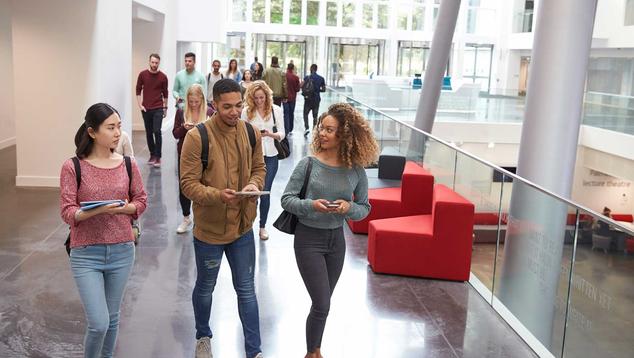WASHINGTON, D.C. -- Although postsecondary enrollment in the U.S. improved slightly in the fall of 2023, overall enrollment rates remain low due to the preceding declines. The fall 2023 modest improvement was driven by increased enrollment in community college and short-term credential programs, rather than bachelor’s programs, which continue to falter.
There were also slight enrollment improvements among Black and Hispanic undergraduates, who have historically been underrepresented in higher education. Understanding these underrepresented groups and their experiences with, and attitudes toward, higher education is important for policymakers and leaders committed to improving enrollments and the impact of higher education for more Americans.
In the fall of 2023, Gallup surveyed 6,015 currently enrolled students, 5,012 U.S. adults who were previously enrolled in an education program after high school but had not completed a degree, and 3,005 adults who had never enrolled in higher education on behalf of Lumina Foundation. The surveys were conducted via a web-based survey using an opt-in panel. Results from the 2024 Lumina-Gallup State of Higher Education Study indicate:
- Black and Hispanic students were more likely than their White peers to consider leaving their program in the past six months.
- The reasons currently enrolled students gave for considering leaving their program (the most important being emotional stress, mental health and cost) are consistent across racial/ethnic groups.
- About six in 10 Black and Hispanic unenrolled U.S. adults report they have considered enrolling in a program in the past two years.
- Certificate and associate programs are most attractive to unenrolled Black and Hispanic Americans.
- Financial aid/Scholarships are the most important tool to attracting unenrolled Black and Hispanic adults and are more important than to their White peers.
Black and Hispanic Students Remain More Likely to Consider Stopping Out
All currently enrolled students were less likely to consider stopping their coursework, or ”stopping out,” in 2023 than in 2022. However, Hispanic (42%) and Black (40%) students remained more likely than their White peers (31%) to say they have thought about withdrawing from their program in the past six months.
While the percentage of Black students thinking about stopping their coursework has been largely consistent since 2022, it is higher than in 2020 and 2021. Meanwhile, the percentage of Hispanic students who considered withdrawing has improved by 10 percentage points in the past year, returning to 2020 levels.
Emotional Stress, Mental Health, Cost Top Reasons Students Consider Leaving
Between 50% and 53% of Black, Hispanic and White students report that emotional stress is the top reason they considered stopping their coursework, followed by 41% to 43% who said it was personal mental health reasons, and 29% to 33% cited cost.
About a quarter of currently enrolled students also mentioned coursework difficulty or a lack of belonging. This lack of belonging may be related to inclusive experiences at school. Twenty-one percent of Black students -- compared with 14% of Hispanic students and 15% of their White peers -- also reported they felt discriminated against frequently or occasionally at school, which is consistent with rates in the fall of 2022.
While retention is important, enrollment cannot significantly improve if schools do not attract more U.S. adults, including those who have temporarily left, or never before enrolled in, higher education.
Black and Hispanic Unenrolled Americans Most Interested in Certificate, Associate Pathways
About six in 10 unenrolled U.S. adults report they have considered enrolling in a postsecondary program in the past two years, and that rate is consistent across racial and ethnic subgroups.
Among all potential pathways -- an industry certification, a certificate, an associate or a bachelor’s degree -- Black and Hispanic adults are most likely to have considered a certificate or associate degree program. A slightly smaller percentage -- 16% of Black and 18% of Hispanic Americans -- report they have considered a bachelor’s degree program, which is similar to White adults (15%).
Financial Aid and Scholarships Most Important to Black and Hispanic Adults
The factors most important to attracting all unenrolled U.S. adults, regardless of race/ethnicity, include financial aid and scholarships, confidence in degree value and increase in their personal income. Although each of these is important to Black, Hispanic and White Americans, financial aid and scholarships are even more important to unenrolled Black and Hispanic Americans.
Fifty-nine percent of Black and Hispanic adults say financial aid and scholarships are very important to getting them to enroll in a postsecondary program in the next 12 months, compared with 50% of their White peers. Relatedly, more Black (46%) and Hispanic (44%) adults also say emergency aid would influence their enrollment, compared with 34% of unenrolled White Americans.
Greater flexibility in one’s work and personal schedule is also more important to Black (55%) and Hispanic (54%) unenrolled adults than to their White peers (46%).
Insights related to the data shared in this article will continue to be released in partnership with Lumina Foundation throughout the spring of 2024. You can learn more about the Lumina Foundation-Gallup State of Higher Education Study here.
To stay up to date with the latest Gallup News insights and updates, follow us on X.




